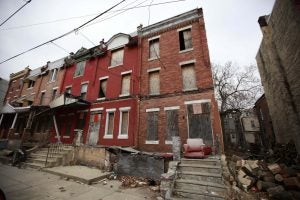Ravaged by Neglect, Part Four: The challenge of fixing Philadelphia’s broken approach to land use

In many ways, and for many years, Philadelphia has failed to implement a practical and effective strategy for collecting delinquent property taxes and putting vacant land and blighted buildings into productive use. The problem is not unique, but other major cities fail to solve it on fewer levels than Philadelphia.
“Speaking from the national perspective, I think there are three key elements of this problem,” says Frank Alexander, co-founder of the Center for Community Progress, a national organization working to resolve the problems of vacancy and blight. “The goal is to have an efficient and effective and equitable system of property tax enforcement.”
Philadelphia’s emphasis on the latter of those three goals—a well-meaning reluctance to foreclose on struggling homeowners—has contributed to a system that is both inefficient and ineffective, as Alexander would put it. As it turns out, though, that emphasis is misplaced: the bulk of our city’s tax debt is owed not by struggling homeowners but by investors.
Other cities have found ways to keep delinquency rates low without putting low-income homeowners on the street. To do so, they use a variety of tools, to varying degrees of success.
Many cities, like Columbus, Ohio, and Chicago, routinely conduct tax lien certificate sales, in which private investors bid for the right to collect past-due taxes directly from property owners. Cook County, home to Chicago, performs a yearly judgment sale in which it sells individual tax liens to qualified buyers looking to make a buck on newly delinquent tax bills. This is simply a way for the county to outsource the collection of delinquent taxes and keep a reliable source of revenue. It also performs a biannual “scavenger sale,” in which purchasers may obtain the title to properties which have delinquent tax bills in at least two of the previous 20 years.
In Franklin County, home of Columbus, tax liens are sold in bulk. The County Treasurer packages delinquent tax bills into portfolios, and sells those bundles to the bidder who offers the lowest interest rate. Eric Sells, delinquent tax division supervisor for Franklin County, said the Treasurer’s Office collects roughly the same amount of money from the threat of the sale as it does from the sale itself. Last year, he said, more than half the posted delinquent tax bills were paid prior to the lien sale.
Franklin County Treasurer Ed Leonard says his office also goes to great lengths to remove liens from the bundle prior to auctions that are owned by elderly, low-income homeowners, as well as from other properties such as churches.
Selling tax debts to private third-party collectors is among the most common tools used by cities and states to keep delinquency rates low, but it comes at a cost. In Baltimore, where liens on all delinquent properties are sold to private collectors on a strict schedule and no payment plans are offered, the collection rate hovers around 99 percent. But that city’s struggles with vacancy and urban blight are no less great than Philadelphia’s.
Frank Alexander says that selling the right to collect delinquent taxes is generally good for treasurers’ offices because it keeps revenue rolling in, but that it can undercut cities’ priorities in other areas.
“My view is that the sale of a tax lien or tax certificate, instead of selling the property, rarely is to the benefit of the local government or the neighborhood,” Alexander said. “The purchaser has incentives that are quite different than the city.”
Since the mid-1990s, New York has drastically reduced its stock of city-owned, tax-delinquent parcels using several tools. One includes a bundled tax lien sale for properties with relatively low tax bills. New York’s success at bundling and selling these properties is unique, according to Frank Alexander. (Philadelphia did this once, under the Rendell Administration, to disastrous results—it eventually defaulted on the bond issue, forcing a bond insurance company to pay back $46 million to lenders.)
The other tool is a program of third-party transfers, wherein properties classified as “distressed” may be deeded to pre-qualified private developers or nonprofit groups without the city ever taking control. In order to be classified as distressed under the program, a property must have a delinquent tax bill that is worth at least 15 percent of the property’s market value, and the building must have at least $1,000 in emergency repair liens or five violations for hazardous conditions.
The program shares some characteristics with land banks, public entities that can acquire, improve, and sell vacant and tax delinquent property. In 2004, Michigan passed legislation allowing counties to create their own land banks. That act, in combination with a state overhaul of foreclosure laws five years earlier, has allowed Genesee County, home of Flint, to operate a land bank that has since acquired more than 4,000 properties.
The Genesee County Land Bank Authority administers a number of programs aimed at making use of otherwise vacant, tax-delinquent properties. It sells foreclosed properties—for cash, or through land contracts, in which the purchaser pays for the property in installments. It offers homeowners a chance to acquire adjacent Land-Bank-owned lots as side yards for $1. It demolishes 100-200 properties a year, performs emergency maintenance on others, and provides resources to neighborhoods interested in maintaining lots owned by the Authority. The Authority also runs a foreclosure prevention program which allows financially distressed homeowners to delay foreclosure by a year or more.
New York State recently granted authority to a handful of counties to create and operate land banks, including Onondaga County and the city of Syracuse. Chicago also started a land bank last year, as did Franklin County, Ohio, which has its own land bank.
The Nutter Administration has been working on a vacant land management strategy that includes a so-called “front door” for individuals or neighborhood groups interested in purchasing city-owned land controlled by a handful of agencies. In February, Nutter also announced a $40 million plan to overhaul the Revenue Department’s technology system and establish a tax collection call center.
The rate of tax delinquency in Genesee County has actually gone up since the creation of the Land Bank, but Christina Kelly, lead planner for the Authority, says its programs have effectively treated the symptoms of that problem.
“The Land Bank doesn’t really get out in front and change the market,” Kelly said. “It’s more dealing with the problem of foreclosed properties.”
Last year, the state granted cities like Philadelphia sweeping power to create land banks. The Land Bank Act was sponsored in the House by Rep. John Taylor and co-written by Frank Alexander of Center for Community Progress.
In Philadelphia, Land Bank proposals have been discussed since early in the John Street administration. Councilwoman María Quiñones-Sánchez recently reintroduced a Land Bank bill that her office has been refining for years. The land bank would not be unlike the Nutter administration’s front door policy, except that it would actually consolidate city-owned property under a single umbrella organization, run by an independent board.
The consolidated inventory of city-owned land is intended in part to reduce the administrative costs associated with disposition of property. The land bank would have the power to request a sale of any vacant or tax-delinquent property, and decide whether to pursue that property before the sale occurs.
The Land Bank’s mission is “to return vacant property to productive status using a unified, predictable, and transparent process, thereby revitalizing neighborhoods, creating socially and economically diverse communities, and strengthening the City’s tax base.” The legislation would compel the City, the Redevelopment Authority, and the Philadelphia Housing Development Corporation to “endeavor with due speed and diligence” to transfer the vacant properties they control to the new agency.
Sánchez has accompanied the Land Bank bill with another that would overhaul the city’s Vacant Property Review Committee. The Committee would hold monthly meetings, and be comprised of District Council members and designees of the Planning Commission, the departments of Commerce, Revenue, L&I, and other city agencies. It would review proposed transfers of properties owned by the Land Bank, and recommend properties to be transferred to it.
“The Land Bank act, for Philly, would allow it to take several steps forward in dealing with the growing inventory of vacant, abandoned, and tax delinquent properties,” Alexander said. “It would not solve it, though, because the tax foreclosure laws in Philadelphia still need to be revised.”
As PlanPhilly has previously reported, the revision of those tax foreclosure laws is under way, thanks to a bill introduced by Councilman Bill Green setting a timeline for foreclosure while implementing a program of income-based payment plans. The bill, which was drafted over the last year by the offices of Green and Sánchez, got a recommendation from Council’s finance committee. Green plans to bring it for a vote before the full Council in the next few weeks.
“We hope that [the bill] has the impact of keeping people in their homes and maintaining homes that otherwise—you can look around the city, this is how this problem happened, this is often how we ended up with blighted houses and blocks,” Councilman Green said.
In February, City Council’s six freshmen members launched a “Taxpayer Fairness Initiative” aimed at exploring ways to bring tax delinquents into compliance. The freshmen so far do not support any particular policy solutions, but have scheduled hearings on the delinquency crisis March 19th and 20th at Council’s Committee of the Whole.
Council President Darrell Clarke also recently reintroduced a modified version of a bill he offered late in 2011 that would create development districts, wherein city-owned land could be transferred to the Philadelphia Redevelopment Authority for further transfer to private developers. A development district would be any census tract in which ten percent of properties meet any two of the following criteria: vacancy, tax delinquency of two or more years, or city ownership.
There is heightened attention at the state level to the problem posed delinquent and blighted properties as well.
Still in the works is a sweeping plan to overhaul the delinquent tax collection system statewide. The legislation, introduced by State Rep. Chris Ross, would require counties to establish tax collection bureaus and begin a foreclosure process on all properties that have been delinquent for one year. It also includes protections for homeowners experiencing financial hardship, requiring counties to “take into consideration the important public interests of preventing homelessness and avoiding property abandonment and blight.” Rep. Ross’ office said the bill is being rewritten, and Ross hopes to reintroduce it sometime this spring.
Contact the reporter at jbrey@planphilly.com and follow him on Twitter @jaredbrey
PART ONE: The Staggering True Costs of Philadelphia’s tax delinquency epidemic
PART TWO: WHO’S TO BLAME? A PROFILE OF THE DELINQUENTS, AND THE NEIGHBORHOODS THEY DAMAGE.
PART THREE: ENABLING THE DEADBEATS. AN INVESTIGATION OF THE CITY’S FAILINGS, AND SOME POTENTIAL FIXES.
ABOUT THIS SERIES:
Patrick Kerkstra has spent years exploring Philadelphia’s property tax crisis. For this collaborative effort between thePhiladelphia Inquirer, PlanPhilly and AxisPhilly, he interviewed property owners, city officials and redevelopment experts and analyzed millions of records in the city’s property, delinquency, billing and code violation databases. That reporting was complemented by a professional economic analysis of delinquency’s impact on property values by Kevin Gillen, PhD, a Fels School of Government economist and the region’s leading property values expert (read his complete study, and methodology). Inquirer editors, photographers and designers produced the package, and PlanPhilly journalists Jared Brey and Ashley Hahn provided significant reportorial contributions. The project was made possible through funding by the William Penn Foundation. Contributors include AxisPhilly‘s news application editor, Casey Thomas, researchers Evan Croen, James Robertson and John Dailey and designer John Suvannavejh.
PlanPhilly.com is an alternative media news website that covers design, planning and development issues in Philadelphia. AxisPhilly is a non-profit news and information organization which educates and engages citizens on topics of public interest.
WHYY is your source for fact-based, in-depth journalism and information. As a nonprofit organization, we rely on financial support from readers like you. Please give today.






